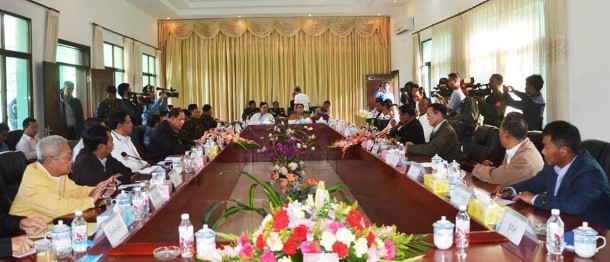RANGOON — The government has invited leaders of the Wa and Mongla special regions to attend the Union Peace Conference scheduled to convene on Jan. 12, an invitation that de facto applies to the United Wa State Army (UWSA), Burma’s largest ethnic armed group, and the National Democratic Alliance Army.
Thein Zaw, vice chairman of the government’s Union Peacemaking Working Committee (UPWC), urged leaders of the Wa to take part in Burma’s peace process as government negotiators met with them in Pangsang, the Shan State headquarters of the UWSA, on Saturday.
“We’d like to invite Wa ethnic leaders to take part in the peace process of the Union. The door to the Union Peace Conference and NCA [nationwide ceasefire agreement] is always kept open,” government newspapers quoted Thein Zaw as saying in state-run newspapers on Tuesday.
The UWSA is a non-signatory to Burma’s so-called nationwide ceasefire agreement, which was signed by the government and eight non-state armed groups on Oct. 15.
Lt-Gen Yar Pyae of the Burma Army accompanied the government negotiators and stressed the need for national reconciliation and national reconsolidation on the occasion, echoing Thein Zaw’s comments about an open door for the Wa.
Though state media reports indicated that it was the leadership of the Wa and Mongla special regions that were invited, the overture applies also to the two regions’ ruling ethnic armed groups, which share the same leadership.
The President’s Office announced on Dec. 18 that the Union Peace Conference next month would be held with a view to finding peaceful solutions through political means for national reconciliation. Ending armed conflict and resolving points of contention would be based on the framework for political dialogue adopted on Dec. 15, the announcement said.
Government peace negotiators also met leaders of the Mongla Special Region, led by its chairman Sai Lin, on Sunday, inviting the latter to attend the Union Peace Conference as a special guest, state media reported on Wednesday.
Thein Zaw told the Mongla leaders on the occasion that the government would not leave behind any group in the peace process, a statement that would appear at odds with the continued exclusion of some ethnic armed groups from the January dialogue.
The National Democratic Alliance Army is also a non-signatory to the nationwide peace accord.
UWSA spokesperson Zhao Xiaofu told The Irrawaddy that leaders of the Wa group had not yet decided whether or not they would attend the Union Peace Conference.
Government-run newspapers reported that leaders of both the UWSA and Mongla groups said they “welcome and support the peace efforts of the president and the progress [made],” and “would not secede from the country.”
UWSA vice chairman Xiao Minliang also reportedly said the UWSA would like to cooperate and enhance trust with the Burma Army.
Khu Oo Reh, general secretary of the United Nationalities Federal Council (UNFC), an alliance of ethnic armed groups, told The Irrawaddy that the UNFC also had not yet decided whether or not to attend the Union Peace Conference. None of the active members of the UNFC has signed the nationwide ceasefire agreement.
Non-signatories have been offered the opportunity to attend with “observer” status, a senior member of the government-affiliated Myanmar Peace Center (MPC) told The Irrawaddy this week.
“We’ve not yet discussed with them [the government]. So it is too early to say whether or not we’ll attend,” Khu Oo Reh said.
The powerful UWSA is believed to have more than 20,000 troops. It has been 26 years since the UWSA agreed to a ceasefire with the government, and the group has said that it need not sign on to the nationwide ceasefire agreement as its bilateral truce remains intact.

















